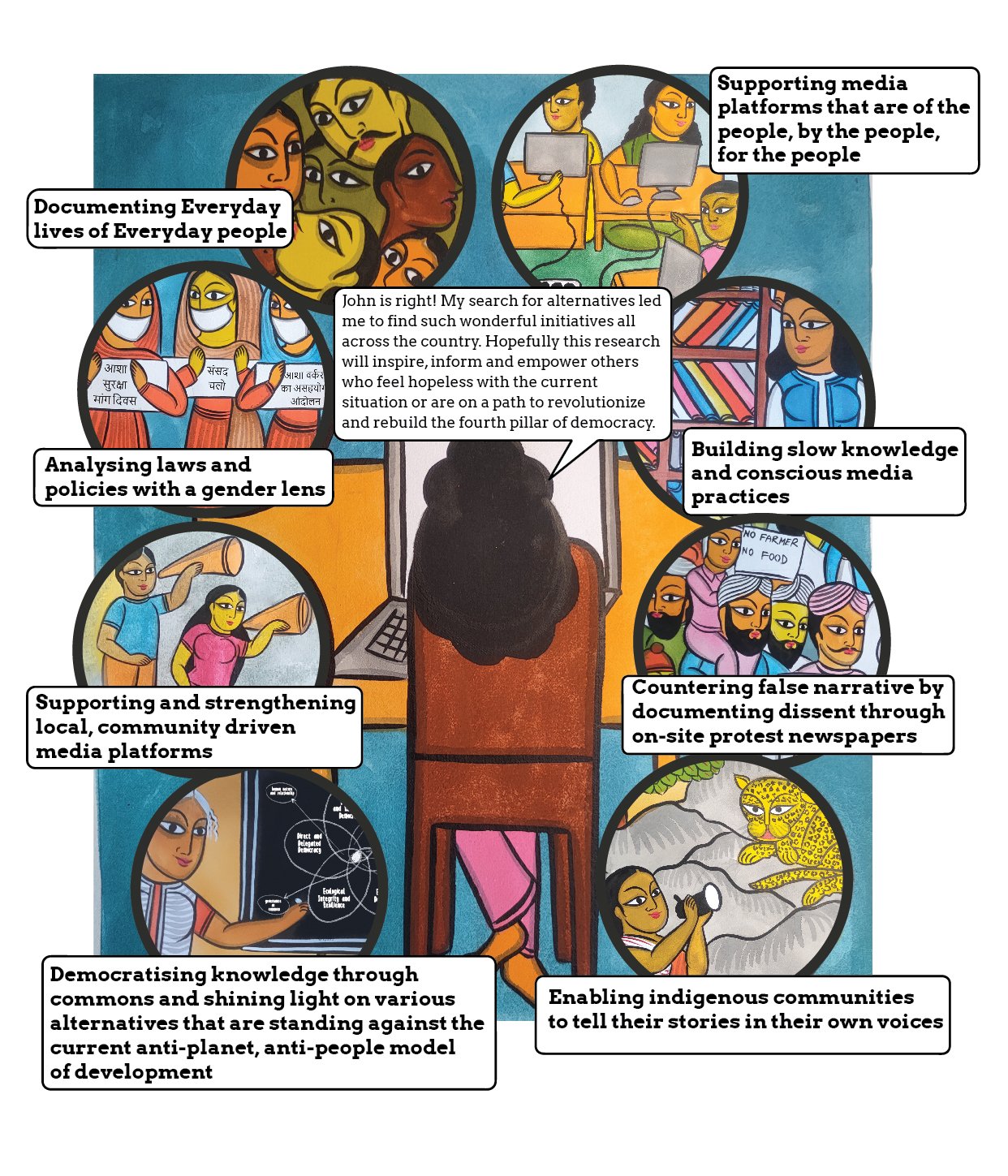Rebuilding the fourth pillar of democracy
Media- the fourth pillar of democracy has crumbled and fallen with truth buried under the weight of false narratives. Voices of the vulnerable have been silenced to favour a few; public issues & interests have been abandoned for revenues and ratings; cultural and professional diversity of the majority of the population has been wiped out for celebrity coverage.
It is a mammoth task to save our bruised and broken nation not just from the spread of misinformation and propaganda but also from rising communal tension, caste and gender based atrocities, hate crimes, media trials, crony capitalism, rising chaos, social conflict and fascism.
To rebuild the fourth pillar of democracy, we have to democratise the media. We have to give up the role of mere spectators and become active participants. We need more representation from those whose voices are often ignored in the public discourse. We need localised, community based journalism that empowers individuals especially the marginalised and the disenfranchised, the ignored and the forgotten, so that they can bring their narratives, concerns, issues and lived experiences to the forefront; engage in democratic debate; become advocates of social change and champions of pluralism.
We have summarised some powerful insights from our conversations with various community-run, media alternatives in ‘Rebuilding the fourth pillar of democracy’ - a graphic narrative to show how the medium can be revolutionised to dismantle the power and privilege of corporate-owned and government-controlled media.
Chapter 1 : Everyday Lives of Everyday People
Chapter 2 : Media-Of the People, By the people, For the People
Chapter 3 : News with a Gender Lens
Chapter 4: Chronicles of Dissent
Chapter 5: Democratising Knowledge through commons
Chapter 6: Stories by Adivasis, Of Adivasis
Chapter 7: Building Slow Knowledge and Conscious Media Practices
Chapter 8: The Media Manifesto
We thank the following individuals and organisations whose powerful experiences supported us in curating this story. If you want to know more or support their work, please click on the links below.
Sweta Daga, People’s Archive of Rural India
Shubhranshu Choudhary, CG Net Swara
Meera Jatav and Priyanka, Chitrakoot Collective
Bhanupriya Rao, BehanBox
Navkiran Natt, Trolley Times
Anuradha Arjunwadkar, Ashwin Parthasarathy and Vasudha Varadarajan,, Vikalp Sangam
Evangelina Kullu, Adivasi Lives Matter
Adil Basha, Bhoomi College
John DSouza, Centre for Education and Documentation
Written by Arnaz Khan and Pooja Dhingra with Ashik Krishnan
Illustrated by Manu Chitrakar
Arnaz Khan is an independent writer, editor and conscious-media professional. At the Centre for Education and Documentation, she strives to create a slow knowledge module. She has been an active alumni of The Blue Ribbon Movement since the past 6 years. Among many experiments with media, she's lead two batches of Media Lab Fellowships, mentored three batches of the Yes Foundation's Media for Change fellow, been a panelist on South Asian Youth Peace Conference's panel on The Role of Media in Social Change.
Pooja Dhingra is an independent conceptualiser, art director and a graphic designer and the founder of Compassion Contagion.
Ashik Krishnan is a traveller and venture-socialist, an advocate of conversation, using dialogue as a tool to explore human emotions and build consciousness in a world that is turning highly transactional. He is the co-creator of Travellers' University and many community-centric initiatives such as Learning City Thrissur and Keeday.
Manu Chitrakar is a Pattachitra artist from West Bengal and has been painting since the age of 15. He loves to depict social issues in his work and has travelled all across India and to Sweden and Paris showcasing his work.








